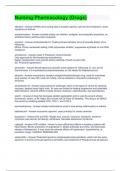Nursing Pharmacology (Drugs)
albuterol - Answer-(SABA) short acting beta 2 receptor agonist, used for bronchospasm, acute
symptoms of asthma
acetaminophen - Answer-centrally acting cox inhibitor; analgesic and antipyretic properties; no
antiinflammatory,antirheumatic properties
acyclovir - Answer-Antimetabolite for Treating Herpes Simplex Virus & Varicella-Zoster Virus
Infections;
MOAs: Purine necleoside analog: DNA polymerase inhibitor, suppresses synthesis of viral DNA,
resistance.
amiodarone - Answer-Class 3 Potassium channel blocker
Only approved for life-threatening dysrhythmias.
Delays repolarization and extends action potential of heart muscle cells.
SE: Profound hypotension."
amoxicillin - Answer-Broad-spectrum penicillin active against H. influenzae, E. coli, and N.
Gonorrhoeae. It is inactivated by beta-lactamases, so not helpful for Staphylococcus.
atropine - Answer-muscinarinic receptor antagonist/anticholinergic drug; used for mydriases
(eye exams), to raise HR, lower GI motility, and as antidote to muscarinic poisoning (rx,
shrooms)
amphotericin B - Answer-broad spectrum antifungal, which is the agent of choice for systemic
mycoses, despite being highly toxic. Its uses are limited to treating progressive and potentially
fatal infections. Adverse effects include infusion reactions, nephrotoxicity, and hypokalemia.
aspirin - Answer-A drug that decrease platelet aggregation and is used to prevent arterial
thrombosis, stroke, or MI. Major SEs include risk of major GI bleeding. This drug is an NSAID
that works by inhibiting platelet COX, COX-1, and COX-2.
beclomethasone - Answer-inhaled corticosteroid used to treat airway inflammation in asthma
bethanechol - Answer-muscarinic agnonist, used primarily for urinary retention
buproprion - Answer-(DA and NE). Weight loss, seizure, insomnia, headache, serotonin
syndrome (see laundry list above), withdrawal, Neonatal Abstinence Syndrome
captopril - Answer-ACE inhibitor - shown to have efficacious effects in treating a patient with
heart failure. Blocks production of angiotensin II, dilates arterioles and veins, and decreases
release of aldosterone. It may show the adverse effects of hypotension, hyperkalemia, or
persistant cough, CARDIAC REMODELING
carbenicillin - Answer-"Extended spectrum (antipseudomonal penicillins), which has the same
spectrum of activity as broad-spectrum penicillins, plus treatment of Pseudomonas aeruginosa
, cefotaxime - Answer-"Third generation cephalosporin with activity against meningitis and
nosocomial infections resistant to others (restricted use). It has greater activity against Gram
negative bacteria, increased resistance to beta-lactamases, and better ability to reach CSF.
cephalexin - Answer-"First generation cephalosporin poor activity against Gram negative
bacteria, sensitive to to most beta-lactamases, unable to reach CSF. Used for Staphylococcus if
mild penicillin allergy.
celecoxib - Answer-2nd Generation Nonsteroidal Antiinflammatory Drug (COX-2 Selective
NSAID); AE: risk of CV events, warfarin may be more effective with celecoxib
cholestyramine - Answer-Inhibits bile reabsorption in intenstine, increases LDL receptors in
liver, accelerates bile excretion. Many of the adverse effects result from the drug not being
absorbed from GI, including constipation and a decreased absorption of fat-soluble vitamins (A,
D, E, & K).
ciprofloxacin - Answer-fluoroquinolone
broad -cidal. PO tetracycline and cipro should NOT BE GIVEN WITH ANTACIDS.
ALSO KNOW IT CAN RUPTURE TENDONS AND CAUSE CANDIDA. "
codeine - Answer-antitussive, AE: respiratory depression
also weak mu opioid agonist
clozapine - Answer-atypical antipsychotic; 2nd Gen. Treats negative symptoms. Greater efficacy
than 1st gen. Fewer EPS/tardive dyskinesia side effects. SE: Agranulocytosis and Metabolic
effects (Weight gain, diabetes, hyperlipidemia)
clonidine - Answer-alpha 2 agonist, HTN drug -> vasodilation
clavulanic acid - Answer-A penicillinase inhibitor that is combined with a broad spectrum
penicillin to increase is bactericidal activity.
clopidogrel - Answer-decreases platelet aggregation and is used to prevent arterial thrombosis
or stroke. Major SEs include risk of major GI bleeding. This drug is not an NSAID and does not
inhibit COX
chlorpromazine - Answer-FGA, low potency, treats positive symptoms. SE: Sedation, orthostatic
hypotension, anticholinergic effects. NOTE: it may take up to 6 weeks to see effects
cromolyn - Answer-mast cell stabilizer, inhaled, for asthma or allergies
diphenhydramine - Answer-1st Generation H1 Competitive Antagonist; antihistamine (benadryl),
sedation effects
digoxin - Answer-"Medication prescribed for treating heart failure and some dysrhythmias. It is
an ionotropic agent with narrow therapeutic index. Increases myocardial contractility and cardiac
output. Improves symptoms but not shown to increase life expectancy. Significant cardiotoxicity
requires monitoring of drug levels and K+ levels
epinephrine - Answer-Mixed Alpha/Beta Adrenergic Receptor Agonists (Nonselective)




